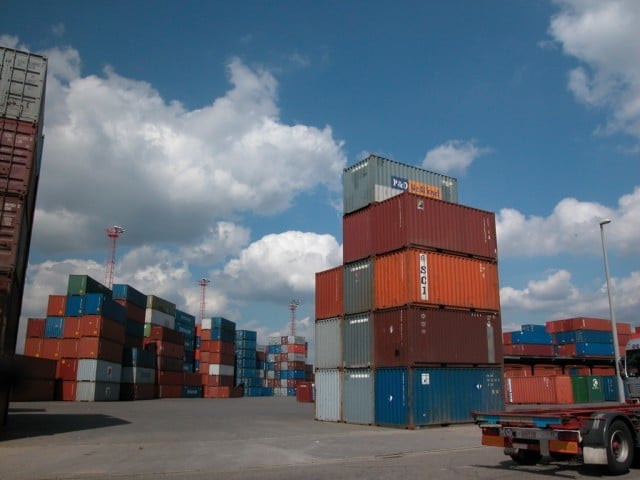Trade associations hail strategic framework
Say incentives will go a long way in increasing exports

Government envisaged Pakistan’s exports to reach $35 billion by the end of fiscal year 2018. PHOTO: FILE
The government announced the Strategic Trade Policy Framework on Tuesday, envisaging Pakistan’s exports to reach $35 billion by the end of fiscal year 2018, an increase of almost 50% from the current level of around $24 billion a year.
“The target of $35 billion by 2018 does not look realistic to me. At a time when our exports are declining, the most optimistic target is $30 billion,” commented Pakistan Tanners Association (PTA) Central Chairman Gulzar Firoz.
Firoz, however, said that the new trade policy will help arrest the decline of exports.
He advised the government to immediately announce the implementation of the zero-rated regime for the five export-oriented sectors from April 1, 2016 instead of July 1, 2016.
The trade policy is designed to significantly increase exports of leather, pharmaceutical products, fisheries, surgical instruments. Moreover, it will incentivise businessmen in exporting fans, home appliances, rice, meat and meat products, cutlery, sports goods among others.
“The rice sector is facing a tough time in the international market and the impact of the trade policy will take some time to increase exports,” said Rice Exporters Association of Pakistan (REAP) Chairman Chaudhry Muhammad Shafique.
The policy has also identified basmati rice as a potential export sector.
“We are confident that rice exporters will definitely gain maximum advantage of the incentives that are announced in the trade policy when the international market recovers from the slump.”
Pakistan Pharmaceutical Manufacturers Association (PPMA) Chairman Hamid Raza said that the trade policy is going to bring revolutionary changes in the pharmaceutical industry.
Pharmaceutical sector is one of the sectors - along with leather, pharmaceutical, fisheries, surgical instruments - that will get matching grants up to a maximum of Rs5 million for specified plant and machinery to improve product design and innovation.
“We are extremely happy to see that the government has incorporated our suggestions in the policy,” he said, adding that the suggestions were based on India’s successful model that has raised its pharmaceutical exports to $25 billion - close to Pakistan’s total exports,” PPMA chief said.
“I think 50 to 100 pharmaceutical companies will benefit from the incentives.”
Published in The Express Tribune, March 24th, 2016.
Like Business on Facebook, follow @TribuneBiz on Twitter to stay informed and join in the conversation.



















COMMENTS
Comments are moderated and generally will be posted if they are on-topic and not abusive.
For more information, please see our Comments FAQ